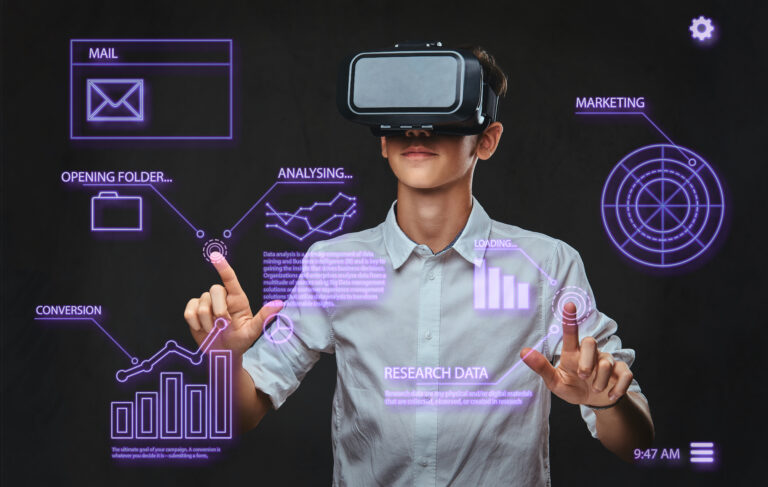The digital revolution is in full swing, and Machine Learning (ML) algorithms are at the center of this transformation. What once seemed like the stuff of science fiction movies is now a reality that impacts everything from healthcare to finance, including retail, education, and industry. Whether you are an entrepreneur, professional, or simply curious about technological innovations, this article will show you how ML algorithms are revolutionizing various areas – and why you need to be prepared for this new era.
The Age of Data and Innovation
We live in an era where data is being produced in unprecedented quantities. Every click, purchase and interaction generates information that, when processed intelligently, can reveal surprising patterns and hidden opportunities. This is where Machine Learning comes in. This technology enables systems to learn from large volumes of data, identify trends and make predictions that transform the way businesses operate.
ML-driven innovation is redefining what it means to be competitive in the global marketplace. Companies that embrace these technologies are not only optimizing their processes, but also creating new business models and improving customer experience. Let’s explore how this revolution is unfolding and how it’s transforming diverse industries.
1. The Power of Machine Learning
What is Machine Learning?
Machine learning is a subfield of artificial intelligence (AI) that enables computers to learn from data, identify patterns, and make decisions with minimal human intervention. Rather than following manually programmed instructions, ML systems are able to evolve as they receive more information, becoming increasingly accurate in their predictions.
Main Types of Learning
-
Supervised Learning:
In this approach, algorithms are trained on a labeled dataset—that is, each example has an associated correct answer. This technique is widely used for classification tasks (such as identifying whether an email is spam) and regression (such as predicting house prices). -
Unsupervised Learning:
Here, the data is unlabeled and the goal is to find natural structures or groupings. Techniques like clustering help segment customers or identify behavioral patterns without pre-defining categories. -
Reinforcement Learning:
In this method, algorithms learn to make decisions through a system of rewards and punishments, adjusting their strategies based on the results obtained. This approach is widely used in robotics and games, where learning occurs through trial and error.
Why is Machine Learning So Impactful?
The true magic of ML lies in its ability to transform raw data into valuable insights. It enables companies to predict trends, optimize processes, and personalize experiences in unprecedented ways, delivering significant competitive advantages.
2. Sectors Transformed by Machine Learning
Health
In healthcare, ML algorithms are revolutionizing disease diagnosis, treatment, and prevention.
-
Imaging Diagnosis:
Deep learning-based systems analyze exams such as X-rays, CT scans and MRIs with impressive accuracy, identifying early signs of diseases that could go unnoticed by human eyes. -
Personalized Medicine:
Genomic data analysis combined with ML allows the creation of tailored treatments for each patient, increasing the effectiveness of drugs and reducing side effects. -
Continuous Monitoring:
AI-powered wearables monitor vital signs in real time, enabling rapid interventions and better management of chronic conditions.
Finances
In the financial world, Machine Learning is a powerful ally for risk analysis and investment optimization.
-
Fraud Detection:
Algorithms analyze transactions in real time to identify suspicious patterns, helping to prevent fraud and protect financial assets. -
Portfolio Management:
Predictive systems adjust investment portfolios based on market analysis, allowing for more efficient and secure management of resources. -
Risk Analysis:
ML models help predict market fluctuations and identify investment opportunities based on historical data and economic variables.
Retail and E-commerce
Personalization and data analytics are crucial in retail, and ML is redefining the consumer experience.
-
Personalized Recommendations:
E-commerce platforms use ML to suggest products based on purchase history and browsing behavior, increasing conversion and customer satisfaction. -
Inventory Optimization:
Predictive algorithms help predict demand and adjust inventory levels, preventing losses and improving logistics. -
Sentiment Analysis:
ML tools analyze customer feedback and reviews, allowing businesses to adjust their marketing strategies and improve user experience.
Education
In the education sector, ML is revolutionizing the way students learn and teachers teach.
-
Adaptive Platforms:
Personalized learning systems adapt content according to each student’s performance and pace, providing a more effective and engaging experience. -
Augmented and Virtual Reality:
Combining ML with immersive technologies creates interactive learning environments that make teaching more practical and intuitive. -
Performance Analysis:
Algorithms identify areas where students have difficulties, allowing teachers to intervene in a more targeted and personalized way.
Industry and Manufacturing
Machine Learning is driving the industry forward with significant improvements in operational efficiency.
-
Predictive Maintenance:
Sensors and algorithms monitor equipment in real time, identifying imminent failures and scheduling preventive maintenance to avoid unexpected downtime. -
Process Optimization:
Data collected in real time helps adjust production lines, reduce waste and increase productivity. -
Intelligent Automation:
Collaborative robots and automated systems use ML to improve the accuracy and efficiency of industrial operations.
3. Challenges in Implementing Machine Learning
Despite the numerous benefits, implementing Machine Learning in business also presents challenges that need to be overcome.
Data Quality
The effectiveness of algorithms depends heavily on the quality of the data used for training. Inconsistent or biased data can lead to incorrect predictions and poor decisions.
- Solution: Investing in robust data collection, cleansing, and integration processes is essential to ensure accurate results.
Complexity and Cost
Developing and deploying ML models requires advanced technical knowledge and upfront investment, which can be a hurdle for small and medium-sized businesses.
- Solution: Start with pilot projects, use accessible tools and invest in ongoing training for your team.
Privacy and Security
The intensive use of sensitive data raises privacy and security concerns, especially with regulations such as LGPD and GDPR.
- Solution: Implementing rigorous security and compliance measures is critical to protecting customer information and ensuring trust in the system.
Need for Requalification
With process automation, there is a growing demand for new skills in the job market. Professionals need to retrain to keep up with technological changes.
- Solution: Provide ongoing training and workshops to keep staff up to date and ensure everyone can take advantage of the opportunities ML presents.
4. Tips for Entrepreneurs: How to Get Started in the Machine Learning World
If you are an entrepreneur and want to take advantage of the potential of Machine Learning, here are some practical tips to get you started:
Invest in Training
Look for online courses, workshops, and training that cover the fundamentals of Machine Learning. Platforms like Coursera, Udemy, and edX offer excellent content for beginners and professionals who want to delve deeper.
Start with Simple Projects
Don’t try to solve every problem at once. Start with pilot projects that can be scaled over time. For example, implement a simple recommendation system in your e-commerce store or use ML to optimize demand forecasting.
Use Accessible Tools and Libraries
Take advantage of libraries like Scikit-Learn, TensorFlow, and PyTorch, which offer a wide range of functionality to build ML models without having to build everything from scratch.
Integrate Machine Learning into Your Processes
Identify areas of your business where data analytics can bring concrete benefits – such as marketing, operations, logistics or customer service – and implement solutions that align with your strategy.
Stay Updated
The field of Machine Learning is constantly evolving. Follow blogs, join online communities, and stay up to date on the latest trends to ensure your business stays ahead of the competition.
Turn Raw Data into Successful Decisions
Machine Learning has the power to transform raw data into valuable insights that can be the key to strategic decisions and the success of your business. By investing in this technology, you not only optimize processes and reduce costs, but you also position yourself competitively in an increasingly data-driven market.
Whether in marketing, healthcare, finance or manufacturing, ML algorithms are shaping the future of business. Mastering this technology is essential for those who want to innovate, stand out and turn challenges into opportunities.
Don’t wait any longer to transform your business. Invest in training, experiment with new tools, and start exploring the potential of Machine Learning to make smarter, more strategic decisions. The future of business is smart and data-driven—and it starts with the ability to turn raw information into real success.








